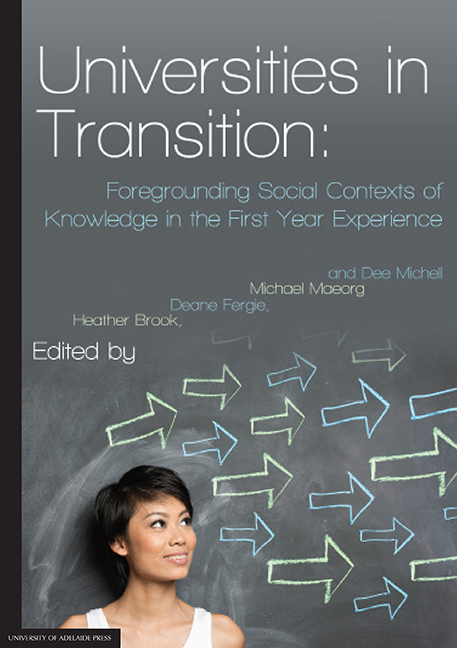Book contents
- Frontmatter
- Contents
- Notes on Contributors
- Introduction
- Part 1 Reconceptualising: transition and universities
- Part 2 Revaluing: ‘non-traditional’ student groups in higher education
- Part 3 Realising: transformations on campus
- 7 The University of Adelaide Student Learning Hub: a case study of education co-creation
- 8 Thinking critically about critical thinking in the First-Year Experience
8 - Thinking critically about critical thinking in the First-Year Experience
from Part 3 - Realising: transformations on campus
Published online by Cambridge University Press: 05 December 2014
- Frontmatter
- Contents
- Notes on Contributors
- Introduction
- Part 1 Reconceptualising: transition and universities
- Part 2 Revaluing: ‘non-traditional’ student groups in higher education
- Part 3 Realising: transformations on campus
- 7 The University of Adelaide Student Learning Hub: a case study of education co-creation
- 8 Thinking critically about critical thinking in the First-Year Experience
Summary
Abstract
This chapter reflects on the current emphasis placed by government and universities on graduate skills, in the face of considerable uncertainties about what these might involve and how they might be developed. One of the key areas of graduate skill development which tertiary students are meant to experience during their university degrees is their transformation into critical thinkers (Rigby, n.d.; ACER, n.d.; Moore and Hough, 2007; DEEWR, 2011; Chan et al., 2002). We note that accounts of critical thinking as a desirable skill for these students are inclined to constitute critical thinking as having an indeterminate meaning. The literature on critical thinking and university education further suggests that this inexactitude leads students to not understand or be unclear about critical thinking. The ‘problem’ in terms of graduate skill development is deemed to lie in students' failure to grasp its meaning, which results in their failure to develop this important graduate skill in spite of its value to them. We wish to provide an alternative approach that is rather at odds with the ‘student deficit’ approach employed in much of the literature. In order to outline this alternative approach we draw upon the findings of a survey and focus groups carried out in 2011 amongst transition students at the University of Adelaide — specifically, students of first-year Politics courses.
- Type
- Chapter
- Information
- Universities in TransitionForegrounding Social Contexts of Knowledge in the First Year Experience, pp. 205 - 228Publisher: The University of Adelaide PressPrint publication year: 2014



